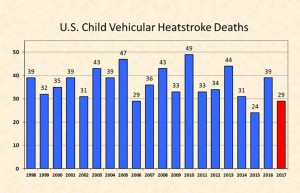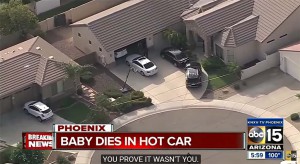Days after two children died in Phoenix after being left in the back seat of hot cars, lawmakers and safety advocates say they’ll push to pass new legislation designed to prevent further deaths.
More than two dozen child and highway safety groups are calling on the U.S. Senate to pass the HOT CARS – short for Senate Bill S.1666, the Helping Overcome Trauma for Children Alone in Rear Seats Act – which has been introduced on Capitol Hill. It would require automakers to equip new vehicles with alarms designed to prevent parents and caregivers from inadvertently leaving children in the back seat of their vehicles.
“A simple sensor could save the lives of dozens of children killed tragically in overheated cars each year, and our bill would ensure such technology is available in every car sold in the United States,” said Sen. Richard Blumenthal, a Connecticut Democrat and co-sponsor of the bill, along with Minnesota Sen. Al Franken. “It can take mere minutes on a hot day for a car to turn into a deathtrap for a small child.”
So far this year, 29 children have died after being left in the back of vehicles, just eight short of the annual average of 37. And with much of the country facing a heat wave this week, proponents fear more youngsters will die.
 Two baby boys died within hours of each other in Phoenix over the weekend. Seven-month-old Zane Endress was found dead after being left in a car in the driveway of his family home on Friday. Year-old Josiah Riggins was left in his parents’ car for hours, apparently forgotten by his father, even though he drove from their suburban home to a local church twice. Authorities have yet to decide whether to file charges in both cases.
Two baby boys died within hours of each other in Phoenix over the weekend. Seven-month-old Zane Endress was found dead after being left in a car in the driveway of his family home on Friday. Year-old Josiah Riggins was left in his parents’ car for hours, apparently forgotten by his father, even though he drove from their suburban home to a local church twice. Authorities have yet to decide whether to file charges in both cases.
Non-profit group Kids and Cars has tracked the deaths of over 800 children since 1990, and according to Janette Fennell, an official with the non-profit group, 90% of such child heatstroke deaths are accidental, but she notes that there are often significant differences in how authorities handle such cases.
Tennessee parents Jade Elizabeth and Anthony Phillips were charged with murder last week after leaving their two-year-old in a hot car overnight. They face the potential of life in prison without parole. Georgia’s Justin Ross Harris was convicted of murder last December in a highly publicized case in which he was accused of intentionally leaving 22-month-old son Cooper in a hot car in June 2014.
Some authorities, however, are reluctant to charge parents, assuming the trauma of losing a child is punishment enough. On the other hand, research by Kids and Cars suggests mothers are often more likely to face prosecution than fathers and other caregivers. The HOT CARS act, among other things, is intended to help develop more uniform policies for authorities handling such cases.
(For more on the bipartisan bill, Click Here.
But the primary goal is to come up with technology meant to prevent child heatstroke deaths in the first place. Even in an era when automakers are rushing to develop cars that can drive autonomously, the problem has proved surprisingly difficult to deal with. Both Ford and General Motors have had to back away from plans to equip their vehicles with sensors that could detect when a child was left in a hot vehicle.
But GM is now using a less sophisticated technology on a number of its products, such as the Chevrolet Malibu sedan. It simply detects when a rear door was opened, possibly by a parent placing a child in a car seat. When the vehicle next stops a chime sound and a warning appears on the instrument panel advising caregivers to make sure to check the back seat.
(GM expands availability of life-saving technology. To see how it works, Click Here.)
Fennell said that as horrid as the heatstroke death of a child might seem, even loving parents can make such a fatal mistake. It’s all the more common when the normal daily routine is disrupted – a mother may be sick, for example, requiring the father to drop the child off at daycare. Rushing to get to work, the parent may operate on autopilot and not remember having a child in the back seat for hours. On a hot day, that could prove too late.
Arizona, where the two weekend heatstroke deaths occurred, has one of the highest rates for such tragedies in the U.S., 18.1 per 1 million residents, according to NoHeatStroke.org. But experts say they have recorded deaths in every state since data has been tracked. Even on a relatively mild day, they warn, a vehicle sitting out in the open sun can quickly warm insider to temperatures fatal for a young child.
Since NoHeatStroke started tracking data in 1998, an average 37 children have died annual. The fatal tally rose to 39 in 2016 and peaked at 49 in 2010.
(Look back to eliminate deaths of kids left in cars. For more, Click Here.)




Is there a sensor that can nullify a parent’s stupidity?
Lawmakers STILL haven’t grasped the idea that stupidity cannot be legislated.